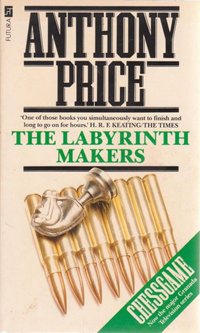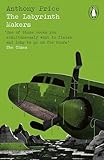With a history dating back to the mid-19th century – or even further, depending on who you ask – the crime fiction genre has seen all sorts of trends over the decades, and given birth to a dozen or more sub-genres. However, nothing beats a classic and when you delve into the genre’s history there are all sorts of gems to uncover. One of them is The Labyrinth Makers by Anthony Price which was re-issued digitally by Phoenix a couple of years ago.
Born in Hertfordshire in 1928, Price served briefly in the Army after World War II before beginning a career in journalism that spanned more than three decades. While he worked, he also penned the 19 Cold War thrillers of the David Audley and Colonel Jack Butler series.
Price’s plan was to present the series a little like a theatrical repertory company, with one or two leads alternating as key characters with each new book. The novels betray his interest in history, which he had pursued as an MA at Oxford. One feature in many of them is a historical mystery running alongside the story’s contemporary one. He had originally planned 20 books but the final one was never written.
The Labyrinth Makers is the first in the set and it features Dr David Audley, a historian-turned-spy. It won the Crime Writers’ Association’s Silver Dagger Award in 1970, coming second to Joan Fleming’s Young Man I Think You’re Dying. Later on, other Paths to Glory won the Gold Dagger in 1974 and went on to make the shortlist for the Dagger of Daggers when the CWA celebrated it’s 50th anniversary in 2005. The Labyrinth Makers was ranked 73 on the CWA’s list of the 100 best crime books in 1995.
In the book, we find David Audley working for the Ministry of Defence as a Middle Eastern analyst, though throughout the series it is clear he really works for an organisation based upon MI5. He is a desk man and has very little experience of working in the field, so he’s alarmed when he’s woken in the night and given instructions to attend the funeral of an RAF pilot.
A lake in Lincolnshire has been dredged revealing an RAF Dakota cargo plane missing since the end of WWII. The plane was engaged in runs between Berlin and Britain. It is found to be empty except for the body of the dead pilot and a number of crates containing house bricks. A red flag has been raised in London as there were reports of Russian agents searching for it shortly after the War, and again since its discovery. Furthermore Nikolai Andrievich Panin, ostensibly an archaeology professor from Moscow but in reality probably spymaster and political power broker, has formally asked to be escorted around the site. Audley’s job is to babysit Panin whilst finding out what can be so important to the Russians.
Interrogation of the remaining air crew reveals the pilot had been engaged in small time smuggling out of Germany, but on his final trip had ferried a much more valuable cargo. What he took, he hid near an army airfield – which is now abandoned all these years later – before faking the crash landing in Lincolnshire. The race is on to identify and find the missing cargo before the Russians, but Audley isn’t aware that the prize for them is not in its monetary or historical value but as the arbiter in a power struggle within the KGB.
In the pantheon of Cold War espionage fiction, Price’s books sit firmly alongside those of le Carré. The charismatic spies, sex and intrigue, and the exotic locations of Ian Fleming’s works are notably absent. Price’s protagonists, like le Carré’s, are cerebral men – thinkers rather than action heroes. In contrast with le Carré, the downbeat atmosphere and sense of a country having to come to terms with its declining influence is absent. It feels as though Price is more comfortable with Britain’s possibly inflated view of itself as a world power. His prose is less literary than le Carré’s, though he does achieve a deceptive simplicity in his writing similar to that of the best American genre writers, like Simmons and McCammon.
There’s little sex or violence, but these are not cosy reads. The ruthless nature of espionage is subtly drawn again and again. Audley is left in the dark by his bosses, vital information is withheld, and it is never made clear if Audley’s transfer to the field is a chance at promotion for work well done, an attempt to control his arrogance, or is setting him up to fail. The enduring appeal of the series, with all having been released in digital formats recently, is testament to the author’s achievement.
Phoenix
Print/Kindle/iBook
£4.99
CFL Rating: 5 Stars











